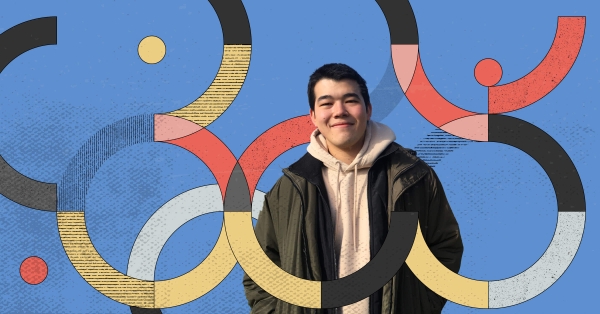Downtime is Uptime: Watermelons, Socks, and Computer Science
Part of a podcast series that spotlights the passions and outside-of-work lives of Metal employees. This week, Zak Ziiaidin shares a peek into his life.

I arrived on the rural campus of Bennington College in Southern Vermont with an exciting prospect at hand: Zak Ziiaidin, a Software Engineering Intern with Metal and Bennington student was planning to show me the End of the World. I had no idea what this would entail, and to get a little more context as to why Zak spends time at the End of the World, we first found a quiet room in Bennington’s student library to talk about his childhood experiences growing up in Kyrgystan.
“I spent all of my life before coming here in Bishkek, the capital of Kyrgystan,” Zak began. “My family is a working family. I would go to school, come back and help my mom at her job. She mostly worked at the bazaar. When I was seven until I turned thirteen, my mom owned the little grocery store, open sixteen hours a day. Over the summer my main responsibility would be to sell fruits. We would take them out of the store and fill a five-by-five meter space with watermelons and things of this kind. I would take this project on separately and at the end of the day I would give the results: how much profit did I make, how much revenue? What did the margins look like? And I would order the items for the next day. It was a really interesting challenge because I kind of owned my own small business, and I would take some small percentage of it for my school expenses.”
When Zak was a little older, his mom moved to the Dordoi Bazaar, the biggest bazaar in central Asia. “We used to sell socks, wholesale socks,” he continued. “It was a lot of hustling. Over the summer I would go there at 5 AM and come back at 8 PM with my mom. The days were full with customers and this chaotic space of being in the bazaar.”
Zak told me one of the things he had to worry about was people trying to steal socks from the store. “Sometimes it came down to the physical thing, you try to catch them, they run away, you try to stop them, you call security and then they deal with it.” He paused to look around the library room. “This does not really happen to me at Bennington,” he says, laughing.
Zak came to realize he didn’t want to work in the markets for the long haul. “My physical abilities do not scale well,” he says, recalling moving 500 kilograms of watermelons in and out of his mother’s store each day, “but my intelligence might be able to scale.” Thus he ended up halfway across the globe in pursuit of a degree in Computer Science from Bennington. Yet he often misses his home country, and that thought brought us out of the library and heading at last toward our promised destination.
“It’s a really beautiful part of our campus,” he said as we stepped out onto a sweeping meadow overlook that students and faculty alike refer to as The End of the World. “We have woods there, the hills—it’s a really good spot to come when I miss my family. We have a lot of hills and mountains back in Kyrgystan. We have a really great view from the city itself. It’s pretty similar, so every time I just come here and convince myself that my family is not that far even though it’s 10,000 plus miles away. I try to imagine that they are right over this hill.”
To listen to the full story, check out this week's Downtime is Uptime podcast.